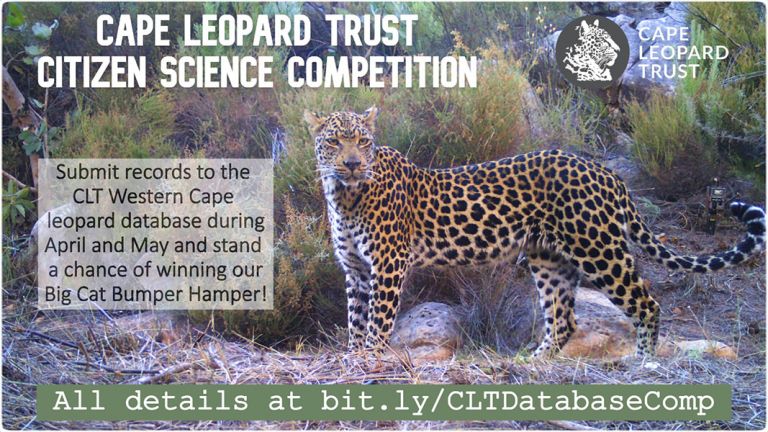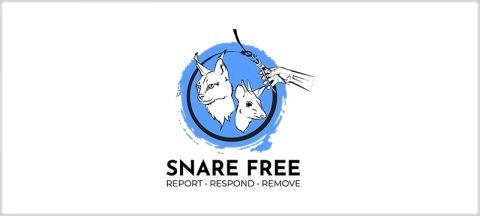Submit records to the CLT Western Cape leopard database during April and May and stand a chance of winning our Big Cat Bumper Hamper!
Have you ever seen a leopard in the Western Cape? How about signs of one? Perhaps you or a neighbour have photographed one on a camera trap? Do you have evidence of potential threats to leopards?
If you can answer yes to any of these and you have a photo to share, you can become a citizen scientist by contributing to our leopard database. If you do so during the months of April and May, you will automatically be entered into a draw to win our fantastic Big Cat Bumper Hamper!
What is the leopard database project?
The Cape Leopard Trust (CLT) is compiling all verifiable observations of leopards, their signs, and threats to leopards across the Western Cape. We are seeking contributions from 2010 onwards and we are especially interested in observations from outside of protected areas. Anyone can upload records to our online portal.
Leopard sighting records can consist of camera trap photos, leopard signs (i.e. spoor/tracks, scats/droppings, scratch marks on trees, feeding sites) and direct leopard observations (i.e. visual sightings). Examples of potential threats to leopards include traps (gin traps or cages), the use of poison, leopard roadkill, and livestock depredation events attributed to leopards.
How to submit your records to our database:
Go to app.capeleopard.org.za and follow the steps to create an account. Please note that a photo is required to validate submissions. Submitted data is confidential, anonymized, and stored securely. Each data point must be inputted individually to the online portal, so if you have multiple observations to share or prefer to contribute via email, please contact[email protected] to request a spreadsheet.
The data portal is both desktop and mobile-friendly. Being a web-based application, it is compatible with various operating systems and doesn’t need to be downloaded to your mobile device. Just save the link to your phone’s home screen and use it as an app.
One lucky citizen scientist will receive a CLT Big Cat Bumper Hamper filled with goodies including:
- Cape Leopard Trust merchandise (buff, cap, notebook, keychain)
- Cape Leopard Trust English or Afrikaans children's storybook
- A case of Leopard's Leap Chardonnay Pinot Noir plus a wine tasting for 6 people
- A bottle of Ginsmith gin
- An 8-pack of Cederberg Brewery beer
- A Hi-Tec basic backpack
- An ORMS voucher to the value of R500
- A signed copy of Deon Meyer’s book “Woman in the Blue Cloak” / “Die Vrou in die Blou Mantel”
- A printed photo of a local leopard autographed by Pieter-Steph du Toit
Competition rules and terms:
- The winner will be drawn from the list of individuals who submit a record during the months of April and May 2021.
- To be entered into the draw, the record must be verified as leopard by our team and the record has to be from the Western Cape.
- Individual names (and not records) are entered into the draw, and each name is only entered once.
- Individuals who prefer to submit records via email (rather than via the online portal) in their personal capacity are eligible, but not representatives of organisations.
- Entries are open to anyone residing within South Africa and aged 18 or above
- Entries close on 31 May 2021 at midnight, and the winner will be announced by the end of June via email and on the CLT social media channels.
Background about the CLT Western Cape leopard database project and online data portal
The Big Five and other large animals like hyenas and hippopotami once roamed the valleys and plains of the Cape region. Only the leopard (Panthera pardus pardus) has managed to persist, largely due to its adaptable and versatile nature, and still roams free in the mountainous regions of the Western Cape. However, the species faces multiple threats, including limited and fragmented habitat, reduction in prey numbers and high levels of conflict with people. The Cape Leopard Trust has embarked on a mission to create a consolidated database of leopard distribution and threats to leopards in the Western Cape Province. This database will contribute towards a leopard habitat suitability assessment and identifying ecological corridors for leopards in the region.
Leopards are nocturnal, solitary animals whose excellent camouflage and secretive nature often means that their presence in an area can go largely undetected. In a bid to centralise leopard presence data we have created an online data portal for citizen scientists to upload their leopard observations and contribute to our database. Within our online “Leopard Data Portal” you can submit your data to one of three purpose-built platforms, namely “Leopard Spotter”, “Threat Tracker” and “Snare Aware”.

















